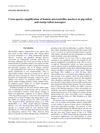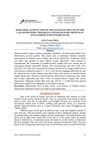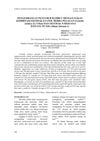 1 citations,
July 2011 in “Climacteric”
1 citations,
July 2011 in “Climacteric” Long-term estrogen therapy in postmenopausal women can improve certain health markers, hair loss is common regardless of hormone use, stopping estrogen doesn't increase breast cancer risk, smoking does, and a balanced BMI is linked to lower mortality.
 1 citations,
June 2011 in “Journal of Genetics”
1 citations,
June 2011 in “Journal of Genetics” Some human genetic markers work for genetic studies in pig-tailed and stump-tailed macaques, which can help in their conservation.
 1 citations,
June 2001 in “Annals of Internal Medicine”
1 citations,
June 2001 in “Annals of Internal Medicine” The document concludes that there is no credible evidence that distant healing works, and it should not be further studied in medical literature.
 June 2024 in “International journal of nanomedicine”
June 2024 in “International journal of nanomedicine” Azelaic acid micro/nanocrystals, especially with ultrasound and salicylic acid, greatly improve acne treatment.
 May 2024 in “International journal of research in dermatology”
May 2024 in “International journal of research in dermatology” Low vitamin D levels are linked to increased risk of male pattern baldness.
 February 2024 in “Journal of ayurveda and integrated medical sciences”
February 2024 in “Journal of ayurveda and integrated medical sciences” Ayurvedic medicine helped increase a young woman's hemoglobin levels and improved her anemia symptoms.
 December 2023 in “International journal of research in dermatology”
December 2023 in “International journal of research in dermatology” Most pregnant women experience common skin changes like linea nigra and stretch marks.
 December 2023 in “Dermatology and therapy”
December 2023 in “Dermatology and therapy” Japanese patients and physicians often disagree on the severity of Alopecia Areata and treatment satisfaction, needing better communication and treatments.
 October 2023 in “bioRxiv (Cold Spring Harbor Laboratory)”
October 2023 in “bioRxiv (Cold Spring Harbor Laboratory)” Early regulatory T cells are crucial for normal skin pigmentation.
 September 2023 in “Mağallaẗ baġdād li-l-ʿulūm”
September 2023 in “Mağallaẗ baġdād li-l-ʿulūm” Microbial communities in Duku plant roots vary between wet and dry habitats, affecting plant health.
 July 2023 in “Journal of skin and stem cell”
July 2023 in “Journal of skin and stem cell” Interferon beta treatment in MS patients can cause skin reactions and increased hair loss.
 June 2023 in “NILES Journal forGeriatric and Gerontology/NILES Journal for Geriatric and Gerontology”
June 2023 in “NILES Journal forGeriatric and Gerontology/NILES Journal for Geriatric and Gerontology” Oral tranexamic acid is a safe and effective treatment for melasma.
 May 2023 in “International journal of pharmaceutical sciences and medicine”
May 2023 in “International journal of pharmaceutical sciences and medicine” Sunflower oil was found to promote hair growth in mice with hormone-induced hair loss.
 April 2023 in “Research Square (Research Square)”
April 2023 in “Research Square (Research Square)” A young woman had a rare, aggressive ovarian tumor that was hard to diagnose and treat, leading to disease progression despite treatment.
 April 2023 in “Medizinische Genetik”
April 2023 in “Medizinische Genetik” New research has found 14 genes linked to the risk of developing alopecia areata, improving understanding and treatment options.
 January 2023 in “Brazilian Journals Editora eBooks”
January 2023 in “Brazilian Journals Editora eBooks” HPLC may detect prediabetes and diabetes earlier than Immunoturbidimetry because it shows higher A1c levels.
 October 2022 in “Asian journal of healthy and science”
October 2022 in “Asian journal of healthy and science” Mother-in-law's tongue leaf extract at 20% concentration significantly promotes hair growth in male rabbits.
 June 2022 in “Organic communications”
June 2022 in “Organic communications” Natural compounds, especially Withaferin-A, may help treat post-COVID-19 complications, but some may have side effects.

Early identification of lupus through skin signs and blood tests is crucial in India.
 January 2022 in “Acta dermatovenerologica Alpina, Pannonica et Adriatica (Tiskana izd.)”
January 2022 in “Acta dermatovenerologica Alpina, Pannonica et Adriatica (Tiskana izd.)” Uncombable hair syndrome causes frizzy hair and can affect the nervous system, eyes, and ears, often co-occurring with other hair, skin, nail, and teeth conditions, and is linked to three specific gene mutations.
 December 2021 in “Jurnal ilmiah Manuntung”
December 2021 in “Jurnal ilmiah Manuntung” The best hair growth results were achieved with a hair tonic containing 5% gotu kola extract and 0.04% garlic extract.
 July 2021 in “International journal of dermatology, venereology and leprosy sciences”
July 2021 in “International journal of dermatology, venereology and leprosy sciences” Diphenylcyclopropenone is more effective and has fewer side effects than dinitrochlorobenzene for treating alopecia areata.
 June 2021 in “bioRxiv (Cold Spring Harbor Laboratory)”
June 2021 in “bioRxiv (Cold Spring Harbor Laboratory)” Gene therapy in mice increased lifespan and improved health without causing cancer.
 January 2021 in “Plant Archives/Plant archives”
January 2021 in “Plant Archives/Plant archives” Dogs with ear infections have a higher rate of yeast infection, especially German Shepherds, with seasonal variations observed.
 January 2021 in “Erciyes medical journal”
January 2021 in “Erciyes medical journal” The COVID-19 pandemic changed the types of skin conditions seen at a clinic, with fewer patients and varying numbers of specific conditions.
 July 2020 in “International journal for research in applied science and engineering technology”
July 2020 in “International journal for research in applied science and engineering technology” The herbal shampoo made from local plants can reduce hair loss and promote hair growth.
 January 2020 in “Journal of Pharmacognosy and Phytochemistry”
January 2020 in “Journal of Pharmacognosy and Phytochemistry” The VCO-based herbal hair tonic is effective, safe for hair loss treatment, and can be mass-produced.
 April 2019 in “International research journal of pharmacy”
April 2019 in “International research journal of pharmacy” Adiantum capillus extract reduces pain and swelling in animals.
 January 2019 in “ISGE series”
January 2019 in “ISGE series” The document concludes that effectively managing PCOS requires a multifaceted approach.
 July 2018 in “Elsevier eBooks”
July 2018 in “Elsevier eBooks” The most common cause of hair loss in children is tinea capitis, followed by alopecia areata and telogen effluvium.





























